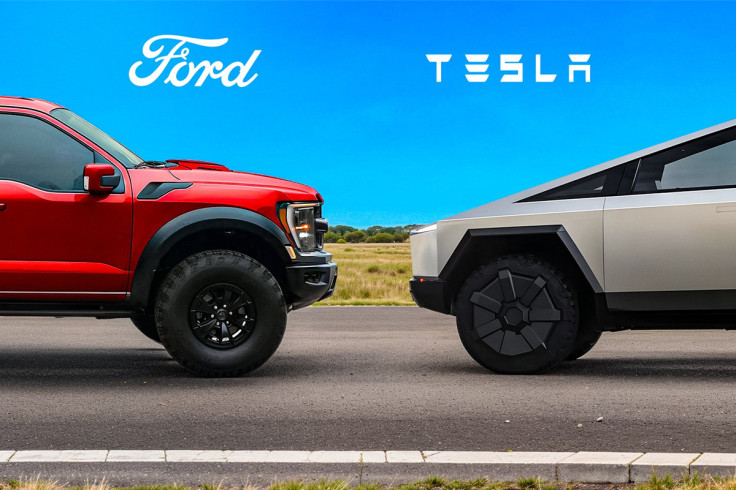Tesla Quietly Rebrands Cybertruck as the New Ford F-150 in Bid to Target 'People Who Do Real Work'
Tesla has subtly rebranded the Cybertruck to appeal to a more traditional 'working man' demographic

In a surprising strategic pivot, Tesla appears to be repositioning its futuristic Cybertruck as a benchmark for rugged utility, taking direct aim at the traditional dominance of the Ford F-150.
Once a Status Symbol, Now a Sales Struggle
Tesla's unveiling of the Cybertruck in 2023 followed four years of anticipation. The angular electric pickup was the company's first new model since 2020, and quickly became a celebrity favourite, with Kim Kardashian, Pharrell Williams and Justin Bieber spotted behind the wheel.
With a reservation list one million strong and a price tag of £90,231.67 ($120,000), the Cybertruck initially emerged as a luxury badge. But less than two years later, that hype has faded. The waitlist has evaporated and the trucks are now stockpiling at dealerships, with fewer than 50,000 units delivered.
Some owners have even reported political targeting due to CEO Elon Musk's growing ties with Donald Trump, prompting a quiet yet deliberate rebrand of the vehicle's image.
From Sci-Fi Fantasy to Working-Class Utility
"Most of the test drivers aren't real truck buyers," they said. "It's more of a novelty thing."
— Matt Drange (@mattdrange) April 22, 2025
And yet, Tesla is trying to position the Cybertruck as a working man's vehicle — "less DeLorean, more Ford F-150" https://t.co/esOmpo0bD2 pic.twitter.com/kaf9wkoiRl
In recent months, Tesla has begun marketing the Cybertruck less as a cutting-edge status symbol and more as a rugged workhorse. Images of the truck hauling equipment and towing Airstream trailers have replaced once-futuristic marketing visuals on Tesla's website.
Sales staff told Business Insider that the vehicle has become a tough sell, and that appealing to traditional pickup buyers is key.
'Pitching it to truck people is more about the functionality,' said one Southern-based salesperson. 'They want to know how much it can tow, how much can fit in the truck bed.'
Tesla is set to report its Q1 earnings amid slow delivery numbers, branding woes, and a stock price that has dropped more than 43% this year.
'They initially pushed too hard into the out-of-this-world aesthetic,' said Ivan Drury, director of insight at automotive research firm Edmunds. 'That only appeals to the outskirts of the market. Now they need to take a more traditional route.'
The Cybertruck Looks More Like an F-150
As recently as April 9, Tesla's website depicted the Cybertruck in a Mars-like landscape, calling it 'built for any planet' with a 'cabin as quiet as outer space'. But by mid-April, those references were removed in favour of more grounded messaging and imagery—targeting contractors and families alike.
The updated page bears a striking resemblance to Ford's marketing of its 2024 F-150, America's best-selling pickup for four decades. Both sites show Airstream trailers and truck beds filled with wiring and gear.
Tesla's new, more affordable Cybertruck variant launched in April, mirroring the electric F-150 in price, range and towing capability. Two Tesla sales associates confirmed a push to pitch the truck to conventional buyers began late last year.
'Most of the test drivers aren't real truck buyers,' said a salesperson. 'It's more of a novelty thing.'
Struggling to Prove Worksite Credentials
Despite Tesla's claims of a 'bulletproof' exoskeleton, early performance didn't inspire confidence. Videos of Cybertrucks stuck in snow or struggling up dirt hills quickly went viral, spawning a 300,000-member Reddit group named 'CyberStuck'.
The vehicle has also faced eight official recalls since its debut, further undermining its image as a dependable worksite vehicle.
Drury believes the rebranding is the right move: 'They need to advertise durability. It needs to be used and abused, and all of the capabilities that make it a work truck need to be on full display.'
Musk's Politics May Be Driving Buyers Away
Tesla's repositioning comes as Musk aligns more closely with right-wing politics. Traditionally, Tesla has appealed to progressive buyers, with showrooms clustered in Democrat-leaning cities. But as Musk's relationship with Trump and his promotion of cryptocurrency DOGE have become more public, some left-leaning consumers have turned on the brand.
Protests have erupted outside dealerships, Cybertrucks have been vandalised, and online backlash has intensified.
According to Cox Automotive, Tesla delivered just 6,406 Cybertrucks in Q1 2025—half the number from the previous quarter.
Deranged anti-Elon lunatic in Arvada, Colorado, attempted to attack a Cybertruck owner with a bat as he drove down the street.
— Libs of TikTok (@libsoftiktok) April 10, 2025
“Does anyone recognize him?” pic.twitter.com/FRPr3VdehI
TERROR: Multiple Democrat NGOs have coordinated attacks on Tesla dealerships, staff, and vehicles. Last night a number of CyberTrucks were torched in Seattle. Democrats are becoming increasingly more desperate and violent. pic.twitter.com/9aGzNpZ382
— @amuse (@amuse) March 10, 2025
Targeting the 'Working Man' Vote
Now, Tesla appears to be courting a different demographic. Endorsements from Trump and Commerce Secretary Howard Lutnick, combined with marketing that embraces traditional masculinity, could appeal to conservative buyers.
Analyst Itay Michaeli of TD Cowen predicts this could pay off in red-leaning counties: 'Tesla could actually net meaningful sales gains over time.'
Brian Moody, editor at Auto Trader, agreed the shift is wise: 'Right out of the gate, they were appealing to the Tesla fans, but most of those people have probably already bought the car. Now they need to focus on the practicality.'
The Cybertruck's story is still being written—but one thing is clear: it's no longer trying to look like it came from outer space. Now, it wants a place on the job site.
© Copyright IBTimes 2025. All rights reserved.






















